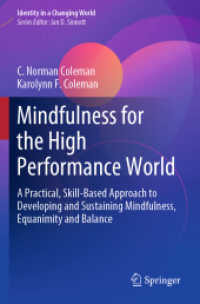- ホーム
- > 洋書
- > ドイツ書
- > Humanities, Arts & Music
- > History
- > middle ages
Description
(Text)
This book comprises the edition and analysis of a waqf-scroll documenting the charitable foundations of a Damascene physician, Ibn Hubayqa, established in the last years of the Mamluk reign. The document is regularly updated and corroborated by courts and judges of all madhhabs throughout the first century of Ottoman rule in the city. Two principal reasons make this document, which is now held at the American Unversity of Beirut, stand out: First, the general scarcity of pre-Ottoman archival material from Damascus, notably the near-complete absence of original waqf-deeds from the city. This is, of course, in stark contrast to the many surviving endowment documents from Mamluk Egypt, a fact that means a severe geographical imbalance in our knowledge of this important institution's history. Second, the profession of the endower and his descendants as prominent physicians makes this a welcome addition to our knowledge of a group that left otherwise very few traces in the literary sources. This scroll allows us to investigate how this physicians' family participated in the spread in personal ownership of rural agricultural lands in the Damascene hinterland in the late Mamluk and early Ottoman period. Finally, the edition and analysis of this rare document will help us better understand the process of transition from the Mamluk to the Ottoman law-court system.
(Author portrait)
Boris Liebrenz studied Arabic philology and History at Leipzig University. In his dissertation (awarded the Annemarie-Schimmel-Forschungspreis in 2018), Liebrenz analysed the history of a Damascene private library and the broader book culture of the city during the Ottoman period (Die Rifa iya. Leiden: Brill, 2016). After research positions in Bonn, Berlin, and New York City, he is currently a research fellow at the Saxon Academy of Sciences and Humanities in Leipzig within the framework of the project Bibliotheca Arabica. He is also a co-editor of the Journal of Islamic Manuscripts. Besides a sustained interest in the history of manuscripts, libraries, and reading, Liebrenz' main publications revolve around the history of Oriental studies, printing, themes of social and economic history, and minorities in the pre-modern Middle East, all with a particular focus on documentary sources from the earliest Arabic papyri to Ottoman merchant letters.








